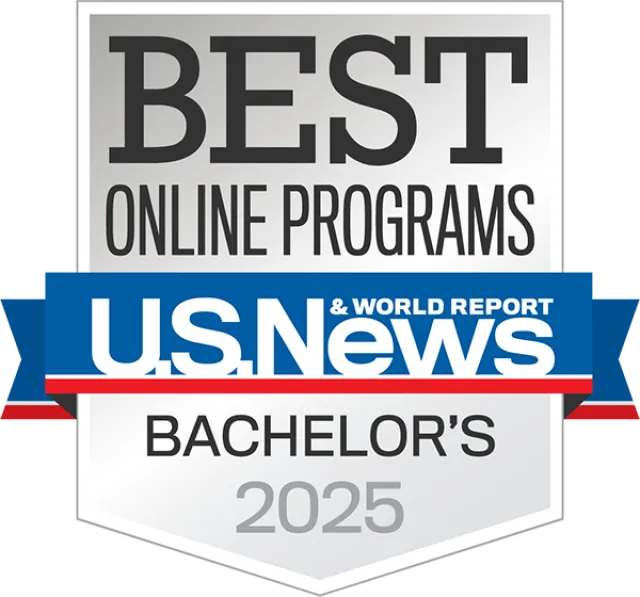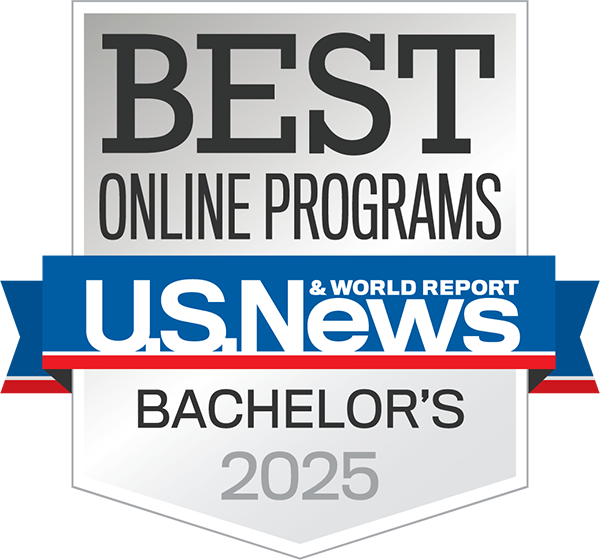Advance your IT career with a bachelor’s degree
| Accreditation | Accredited by the Higher Learning Commission |
|---|---|
| Transfer credit | Up to 90 approved credits |
| Format | 100% online classes you can take right at home |
| Certifications | Develop the comprehensive education necessary to sit for several key industry certification exams—we pay for your first attempt!1 |
| QuickPaths | Earn dual credit towards a Master of Science in Computer Science or Master of Science in Cybersecurity; transfer credit, stackable credentials, and adaptive learning technology build a faster pathway to a higher education with Herzing University |
Learn More Today!

Ranked by U.S. News & World Report as one of the best online bachelor's programs in 2025
Bachelor of Science in Information Technology (IT)
The Bachelor of Science in Information Technology degree is a 120-credit undergraduate program which prepares you for a career in IT.
The online degree program provides students with fundamental knowledge and skills in computer networks, network security, routers and switches, cloud computing, network and server operating systems, and much more.

Career-focused curriculum
Discover the crucial knowledge and skills required to succeed in your work and build a foundation for continued career growth.
Flexible schedule
We work hard to help you maintain school-life balance, striving to be as flexible as possible for busy non-traditional students.
Virtual services
Access to extensive virtual services, including academic advising, tutoring, support services, technical support and library services.
Lifelong support
We support your ongoing career advancement by providing comprehensive, personalized student services with lifelong career coaching.
Rolling admissions
No application deadlines to worry about. Apply when you’re ready and prepare to get started soon.
IT bachelor’s degree classes & curriculum details
In addition to a solid computer science curriculum, Herzing’s bachelor’s degree program includes a strong focus on infrastructure. Students take in-depth courses in the various aspects of client/server operating systems, network infrastructure administration, security and scripting as well as database design, cloud computing, virtualization and business systems analysis.
All classes are delivered online. Graduates are prepared for a broad range of careers in virtually any public service, private industry or government organization.
| Program | Months i | Credit |
|---|---|---|
| Bachelor of Science in Information Technology (IT) | 32 | 120 |
iAverage number of months for students to complete program
Program availability varies by location
Required Courses
All courses, 67.00 semester credit hours, are required.
or IT 500 Network Engineering
or IT 520 Project Management for Cybersecurity
or IT 621 Advanced AI and Machine Learning (AI/ML)
or IT 611 Big Data Analytics
Open Elective Courses
A minimum of 12.00 semester credit hours is required. Eligible students can take approved dual credit graduate level courses to complete a portion of the open electives requirement.
Dual Credit Courses
Eligible students can replace up to 12.00 semester credit hours of the core program requirements with approved dual credit graduate level coursework. A total of 12.00 graduate semester credit hours can be taken throughout the student's program. Graduate Program Applicable Dual Credit Courses Master of Science in Computer Science IT 500 Network Engineering IT 611 Big Data Analytics IT 621 Advanced AI and Machine Learning (AI/ML) Master of Science in Cybersecurity IT 500 Network Engineering IT 520 Project Management for Cybersecurity
Required Capstone or Internship
3.00 semester credit hours are required.
* Online students in some states may not be allowed to take this internship due to state restrictions.
Required Courses in General Education
Students enrolled in this bachelor's degree must complete a minimum of 36.00 semester credit hours in general education distributed among the following disciplines. Refer to the General Education section of the catalog for specific information about courses within each discipline. Courses transferred from other accredited colleges may also be used to meet these requirements.
Personal and Professional Development Courses
All courses, 2.00 semester credit hours, are required.
Get educated, and get certified
Complete our bachelor’s degree program and we will pay for your first exam attempts for several key industry certifications:1
- CompTIA A+. Master and confirm your core IT skills and knowledge necessary for success in a variety of IT support positions.
- CompTIA Network+. Show employers you’ve got the ability to configure, manage, and troubleshoot IT infrastructure.
- CompTIA Security+. Prove your proficiency in basic IT security skills required for roles in cyber security and systems administration.
- PCEP – Certified Every-Level Python Programmer. Verify your familiarity with the essentials of Python programming and universal programming concepts.
Our goal is to fully prepare you with the comprehensive skillset needed to excel professionally immediately upon graduating—and build a strong foundation to continue advancing your career. Getting certified is an excellent way to become more qualified not only for entry level jobs after graduation, but advanced career opportunities in IT in the future.
Save time and money by earning dual credit
Students enrolled in Herzing University’s information technology bachelor’s degree program can get a head start on earning a Master of Science in Computer Science or Cybersecurity.
Qualifying students can take up to 12 graduate credits while still an undergraduate and apply these credits toward both their BS and MBA degrees.
Tuition & Cost
Tuition & Cost
The cost of tuition for the Bachelor of Science in IT program is $515 per credit.
You can potentially earn even greater savings by transferring credit from prior college coursework, applying for financial aid, or potential partnership opportunities through your employer.
Our goal is your career advancement. That's why we are always working to improve our curriculum and processes to make our program as affordable as possible while preparing you best for success in your work.
Scholarships & Financial Aid
You may be eligible for multiple scholarships and grants, both through Herzing University and several national scholarship websites.
Military/Veteran Discounts
Veterans, Active Duty U.S. Servicemembers, and spouses may qualify for a 10% tuition discount or tuition reduction to $250 per credit.
Waived Enrollment Fee
Discover the educational pathway designed to maximize your career potential. Reach for greater heights with Herzing University.
Admissions requirements
Prerequisites to enroll in the Herzing University Information Technology bachelor's degree program include:
- Prior education requirement. Completion of high school diploma, GED, or equivalent.
- Entrance testing. Applicants must demonstrate the capacity to succeed in college-level courses via prior ACT/SAT scores, completion of prior college credit, or additional entrance testing.
- Availability of time, personal commitment, and a professional attitude. We exist to help enthusiastic students fully committed to reaching their highest career goals. Our faculty and leadership are dedicated to helping you reach them.
You will need to meet and interview with a Herzing University admissions advisor and complete an enrollment application to be admitted into the program.
If you have any additional questions regarding admissions into the program, please contact our admissions team.
Faq
Frequently Asked Questions
Didn't find the answer to your question? Send us an inquiry and we will be happy to answer all your questions!
Because IT is such a diverse field requiring a wide array of skills and personality types, there’s a really good chance there’s an IT job out there that’s right for you.
A career in information technology could be right for you if you:
- Enjoy working with computers
- Can work well in a wide range of environments
- Find technical problem-solving very satisfying
- Work well alone and in a team
There are many types of IT degrees to choose from to match with your personality, skills, and overall career aspirations.
Your potential salary can vary widely depending on your career path. Information technology covers a broad array of jobs, from entry-level positions in user support to advanced managerial or executive-level roles.
According to the Bureau of Labor Statistics (BLS), the average wage estimate for computer network support specialists is $79,610 per year, while computer and information systems managers can potentially earn well beyond $100,000 per year.* There are many other jobs in IT you may pursue falling within that general range, including computer programmer, software developer, information security analyst, database administrator, and much more.
In the field of IT, you can build the career of your choosing and potentially make an excellent salary no matter which path you walk.
There are many different types of careers you can choose with an IT degree. While a Bachelor of Science in Information Technology can help you prepare for many of them, in some instances you may choose a more specific or specialized focus for your bachelor’s degree education. Potential IT-related jobs include:
- IT Support Technician/Specialist
- Information Security Analyst
- Software/Application Developer
- Computer Systems Analyst
- Database Administrator
- Computer Programmer
- Computer and Information Systems Manager
- Health Information Manager/Technician
Information Technology (IT) is a broad and evolving career field encompassing a wide variety of tasks and core competencies. Because of this there are a few key types of IT degrees to choose from, including:
Yes!
Going back to school to earn a bachelor’s degree in information technology positions you to become eligible for jobs with solid average pay and an optimistic projection for growth from the Bureau of Labor Statistics (17% increase expected for computer and information systems managers from 2023-2033*). You will have an opportunity to pursue many different types of job opportunities.
Your path to a career in IT begins by getting educated. Herzing University exists to help you build your skills and earn the education you need to pursue the career of your dreams. Apply today!
Tech-savvy business professionals can find real success in a technology management role.
Skills of an excellent IT manager include:
- Are logical – like to solve problems in math or science
- Are comfortable working with your hands as well as your mind
- Have an aptitude for working with the latest technology
- Can communicate and explain technology to non-tech professionals
- Enjoy directing projects and motivating people
- Think strategically, analyzing business goals and providing IT solutions
- Are a leader, able to get the most out of your teams
No matter your preference, Herzing University offers an IT bachelor's degree program to help you fully prepare for the many job responsibilities of IT managers.
How long it takes to earn an information technology degree depends on the degree level you choose. With Herzing University, programs last from less than 1 year to just under 3 years:i
- Certificate in Information Technology - Technical Support: 8 months
- Associate of Science in Information Technology: 16 months
- Bachelor of Science in Information Technology: 32 months
i. Average number of months for students to complete each program
An information technology degree is designed to help you prepare for a broad range of positions in the field of IT.
An IT degree program develops foundational skills in computer networks, database concepts, Linux administration, network security, network and server operating systems, and more. Advance to an undergraduate program and course study can include routing and switching, technical writing, cloud computing, scripting and even programming.
Our career-focused IT degree programs emphasize the practical skills necessary to succeed in your work and create opportunity for career advancement.
A bachelor’s degree IT curriculum includes a wide variety of class topics to prepare you well for many different types of potential jobs. Our bachelor’s degree curriculum includes these class topics, among many others:
- Programming Logic
- Database Concepts and Applications
- Computer Architecture and Troubleshooting
- Linux Administration
- Network Security
- Routers and Switches
- Technical Writing
- Cloud Computing
- Python Programming
Our curriculum is designed to prepare you for a wide variety of potential jobs and key industry certifications, including CompTIA Security+, Network+, and A+.
You can choose several elective courses to focus your study in a particular area of interest.
IT managers combine project management, operational management, computer systems, networking, and people skills to successfully design, implement and maintain IT solutions for a business.
Managerial jobs in information technology feature one or both of two general roles:
- Operational role. Ensure smooth operation of day-to-day projects.
- Strategic role. Advance big-picture IT objectives for the business.
All IT management positions demand candidates who stay current with the latest solutions and best practices for running IT operations that are secure, efficient and innovative.
Program Finder
Bachelor of Science in Information Technology
On Campus OnlineTo learn more about this program, click the Request Info button.
Request Information
Ready to get started?
Contact us to request more information
The Student Experience at Herzing
With Herzing, I didn't have to go through the runaround that was involved with the four-year colleges, and the curriculum was more specific to what I wanted to learn.
Stephen Fichter
Technology Student | Madison CampusAs a woman, I can see how underestimated we are within the IT industry, but I am excited to go against the grain in my career!
Sharee A. Smith
Technology Student | Atlanta CampusAfter weeks of searching, I had several job offers and now I work for RMS Associates as a Network Technician. I was looking for a challenge and I got that at Herzing University.
Cryston Heaven
Technology Student | Atlanta Campus"My education has helped me in numerous ways, both in my professional career and in my personal life."
Josh Colvin
Technology Student | Madison CampusHerzing University prepared me for a lot of the things I see on the job today.
Steve Kramer
Technology Student | Madison CampusHerzing’s technology program made it possible for me to develop the professional skills I needed to succeed as a Windows System Engineer at Cerner, one of the top IT healthcare companies in the world.
Ronald Crayton
Technology Student | Atlanta CampusAccreditation & Disclosures
Herzing University is accredited by the Higher Learning Commission (hlcommission.org), an institutional accreditation agency recognized by the U.S. Department of Education.
1. Certification is not a state requirement. Payment for first exam attempt(s) requires meeting certain University guidelines, including passing specified courses, completion of exam preparation materials, and more. Please contact admissions for more information.
View Herzing University Accreditation and Approvals
* BLS pay estimates calculate the median annual wage for various occupations. Per the BLS the median wage for an occupation is: "The wage at which half of the workers in the occupation earned more than that amount, and half earned less. Median wage data are from the BLS Occupational Employment and Wage Statistics survey." Bureau of Labor Statistics (BLS), U.S. Department of Labor, Occupational Outlook Handbook 2024. BLS median wage estimates do not represent entry-level wages and/or salaries. Multiple factors, including prior experience, age, geographic market in which you want to work, and degree level and field, will affect career outcomes, including starting salary and earnings as an experienced employee. Herzing neither represents that its graduates will earn the median salaries calculated by BLS for a particular job nor guarantees that graduation from its program will result in a job, promotion, particular wage or salary, or other career growth.
Recent Blog Posts
Waived Enrollment Fee
Discover the educational pathway designed to maximize your career potential. Reach for greater heights with Herzing University.








